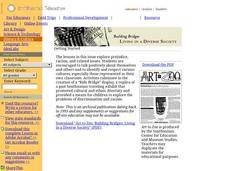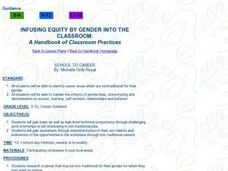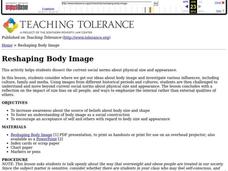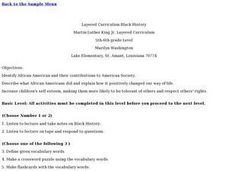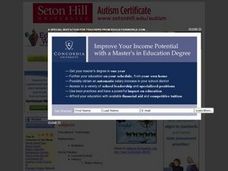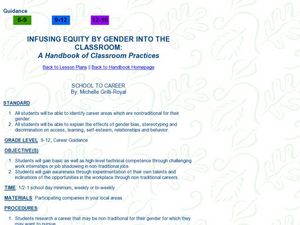Nemours KidsHealth
Self-Esteem
It's important to have healthy self-esteem, but it't not always easy for a teen to identify and maintain it. Support your pupils' healthy self-esteem through grand conversations, daily positive self reflections, and scenario problem...
Nemours KidsHealth
Eating Disorders: Grades 9-12
After gathering information about various eating disorders, high schoolers create a poster or infographic that presents both unhealthy and healthy appearances and eating habits. A second activity asks pupils to craft letters of advice to...
Curated OER
Building Bridges: Living in a Diverse Society
Students participate in various activities that help them build esteem, and explore racism. In this multicultural lesson plan, Students increase their awareness of, and appreciation for, cultural differences and similarities. This...
Learning for Justice
Beauty is Skin Deep
If you are in need of a lesson on tolerance or the impact of media, this plan could be useful. The class begins with a brainstorming session in which they reflect on their own experiences with bias based on appearance. Next, they...
Curated OER
Gender Equity in the Classroom and the Workplace
Students research careers non-traditional to their genders. They job shadow at cooperating businesses and investigate gender bias, stereotyping, and discrimination.
Curated OER
Reshaping Body Image
Students view images and write responses based on their impressions. In this body image lesson, students brainstorm how body image is influenced culturally and participate in a small group discussion on these influences. Students view...
Curated OER
Martin Luther King Jr. Layered
Learners identify African American and their contributions to American Society. They describe what African Americans did and explain how it positively changed our way of life. In essence, this lesson plan increases children's self-esteem...
California Department of Education
How to Succeed in Life
Is it possible that six simple traits lead to a happy, successful life? Part four of a six-part series of college and career readiness lessons examines the effects of character in determining success. Working groups discuss...
Bully Free Systems
Bully Free Lesson Plans—12th Grade
Two sample lessons from a curriculum unit on bullying provide high school seniors with an opportunity to assess their online and cell phone behavior and to consider how they can offer support to bullied students. Each plan includes an...
Curated OER
Stay Fit, 'Cause You Never Know.
Young scholars identify what "Active Living" means and compare and contrast the relationship between fitness and active living by developing a recipe for Active Living. They examine Canada's Food Guide to Healthy Eating and the...
Curated OER
Everybody Is a Winner in the Iditarod
Students read an article about the Iditarod winners. Using the document, they answer questions on a worksheet and examine the history of the race as well. They complete an activity using the internet to end the lesson.
Curated OER
White Bear Lake Fitness Challenge
Students participate in fitness challenge. After choosing a destination they would like to visit, students record their mileage to their destination after riding on bikes and walking on treadmills. Students receive an incentive...
Curated OER
Paper Mache Caterpillar
Students read The Very Hungry Caterpillar by Eric Carle, and practice fine motor skills by using scissors and newsprint strips, and balloons to create paper mache caterpillars.
Curated OER
Student Learning-Strengths Inventory
Learners complete an online inventory to determine their strengths and weaknesses. They create graphs to show their results. They discover how they are unique from their classmates.
Curated OER
Sentence Game
Students explore and study what they already know about grammar and sentence structure to reinforce their mastery of assessing the eight parts of speech. They match a set of colored word cards with their correct part of speech and create...
Curated OER
Gender Equity: Gender Role Assignment
Students analyze and compare personal and societal perception of gender roles. In this gender roles activity, students record their personal point of view on various tasks such as doing dishes or car maintenance. Students then work in...
Curated OER
EMOTIONS AND GENDER EQUITY
Students discuss emotions and decide as a group which emotions are O.K. for males/females. They discuss solutions to gender bias in terms of the different emotions and write a reflective essay about what they learn from the discussion.
Curated OER
Infusing Equity by Gender into the Classroom: School to Career
Learners identify nontraditional career areas for their gender and discuss gender bias and stereotyping. In this nontraditional careers lesson plan, students research a nontraditional career and shadow the job in the workplace. ...
Curated OER
INFUSING EQUITY BY GENDER INTO THE CLASSROOM:A Handbook of Classroom Practices
Students examine how gender bias, stereotyping, and discrimination impacts their lives. Students examine behaviors they believe are acceptable for males and females and will compose an essay based on their findings.
Curated OER
Infusing Equity By Gender Into the Classroom:
Students analyze personal perception of gender role assignments. They complete their "personal" point of view, then complete the "societal" view as a group.




